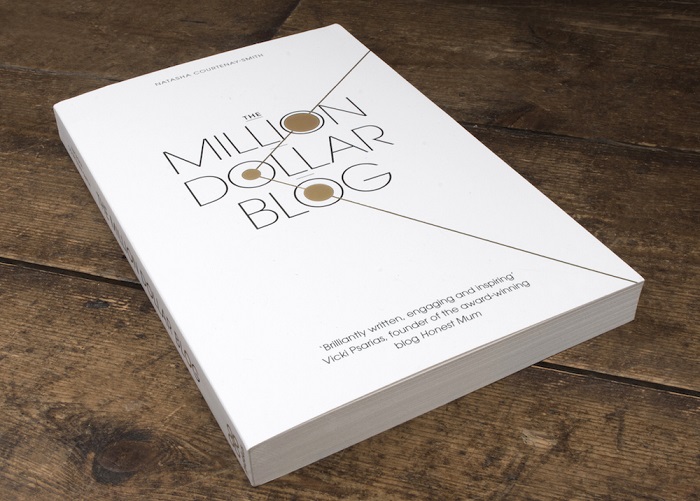Natasha Courtenay-Smith shares blogging secrets
Following our spotlight interview, Natasha Courtenay-Smith, entrepreneur, digital marketing strategist and publicist rejoined us for a special webinar to share exclusive inside info on how to get rich by blogging. Having interviewed the world’s leading bloggers, vloggers and content strategists for her new book ‘The Million Dollar Blog‘ who better to lead a webinar on this topic? Drawing on her vast knowledge Natasha explained the importance of having a business plan, branding, having a niche, creating evergreen content, and having multiple streams of income. Despite covering a lot of ground during the webinar, she was not able to answer all questions from our listeners with the time we had available, so Natasha has returned to answer your questions.
How should you go about monetising your views as a blogger? Income from blogs falls into two distinct spheres – direct earnings and indirect earnings. Direct earnings come from advertising or helping to sell other company’s products, indirect earnings come from tangible opportunities that arise as a result of your blog’s success. Direct earnings might be sponsored posts, ads, collaborations, affiliate links. Indirect earnings are things like consultancy, freelance opportunities, books and speaking.
What are your top tips for building an audience, both on the blog and social media? Consistency, consistency, consistency.
Are there any other ways of sharing blogs other than social media? Yes! Email marketing, publicity and also talking about them in real life! Going out and about to networking events.
Carrie Green is one example, she’s an entrepreneur who founded the Female Entrepreneur Association. Through sharing the stories of successful women on her blog, she has a hugely successful website plus social media followings of over 300,000, and a membership club for female entrepreneurs which has over 3000 members from around the globe paying £30 per month (and with a waiting list for entry).
Carrie told me: ‘I networked like a crazy person and built momentum by taking massive action. It’s too easy to take a step back and say, ‘I’m putting all this work in and no one is reading it, no one is commenting.’ I googled networking events to go to, found a list of them and started going along to them. I was terrified: networking is awkward and I’m a real introvert.
I’ve been to both great events and awful events, but I soon started to build up a group of people who knew me and knew what I was doing. People would say, ‘I’m interested in your story, do you want to come and be on a discussion panel?’ Then I’d say to my family and friends, ‘I’m doing this thing today, come along!’ I even went down to a local fair near my parents’ house and a local radio station was there and I asked them to have me on the show. They agreed and it felt like a huge deal at the time; I couldn’t believe I was on the radio!’
Do you have any suggestions for what to charge when approached by a brand? This is niche specific and brand specific. You might charge a huge brand more for the same thing than you would charge a cottage industry business wanting to work for you. You need to start to understand the rates in your niche by talking to both your fellow bloggers (just ask them, what did X pay you for that) and also digital marketing managers at the brands in question. It’s a bit of a game of blind man’s bluff. Let them take the lead, say things like: ‘What budget do you have in mind for this?’ and then try to negotiate them up!
How often should you post content to build traffic? Generally, content = traffic. It equals something to share on social media and something new for Google to send you visitors for. There’s no perfect amount. The most successful blogs and online media brands post dozens of times a day. It’s more about what you can realistically maintain. As consistency is everything here!
At what point should a blogger create a media pack? Well, according to Vuelio, blogs start to get monetised at around the 10,000 visitors per month right? So definitely once your traffic is that high. But I would say as soon as you’ve got your blog looking the part, you’re clear on your positioning. Launch strong, open the doors for business. Start how you intend to go on! You never know who might be reading and who might be wondering about approaching you.
What are the best platforms for setting up a new blog? I’m going to say WordPress – but with the caveat that that is what I’ve used since 2008, it’s what I build my client sites on so it’s what I know. I feel its endlessly flexible and can adapt to anything and you never need to move from it – and it only seems to be growing in popularity. But I haven’t done any scientific analysis and there may be a tech geek out there who would have valid reasons why something else is better.
What would you say constitutes engaging content for a business blog? Obviously that depends on the business! But I think behind the scenes and glimpses inside a business always works well – meet the team, inside our office or factory. And I would say answer what your clients are asking you as at least you know that is information that they are seeking.
How should you go about creating a business plan for your blog? Bear in mind most bloggers have no plan at all, they just have enthusiasm but that then wanes. Just get clear on the business model you are running, and write up a single page. It doesn’t have to be the sort of business plan the bank might need. It can be more human than that. Answer questions like: ‘My blog will make money through’. The next steps I need to take are’, ‘When this blog is fully grown it will’, ‘Just get the big picture down in writing’.
How do you turn blogging into a successful brand and create multiple streams of income? You accept that you’re not going to have overnight success, and you buy my book, The Million Dollar Blog!















